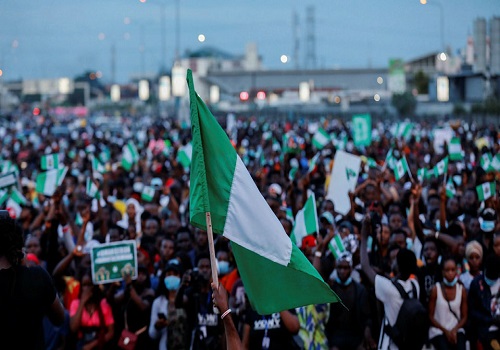

Editorial/Commentary
Freeloaders’ creed
Freeloaders’ creed
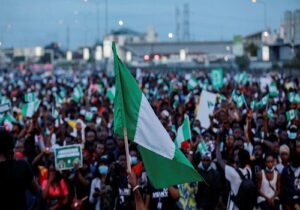
The story is as old as the first misstep of our fledgling republic. But the truth bears repeating because the wound festers still, growing deeper with each cut. While reporting recently on this very topic, I found myself drawn yet again to the performance and unholy alliance between the common man and the bureaucrat—each playing his part in a silent sabotage.
A recent tour of Lagos brought me face to face with the latest act in this ongoing drama. Electricity marketers and technicians spin their webs, bypassing meters as deftly as any thief might pick a pocket. The people nod approvingly, grateful for the temporary relief. The electricity they siphon becomes not a crime, but a necessity, a balm for their daily hardships.
“We had no choice,” they say, the mantra of a thousand justifications. But beneath this veneer of desperation lies a stark reality—every stolen kilowatt-hour is a dagger thrust into the heart of the nation’s future.
Francisca Pajok, a hairdresser in her mid-thirties, is one such character in this unfolding tragedy. In the dim light of her salon, her idle hands tell the story of a business that has learned to steal its survival. Her generator hums softly outside, its power fed not by the legitimate flow of electricity but by a covert artery—her tampered metre. Pajok feels no guilt, no shame, just revulsion over being found out and disconnected. She is a product of a society where it is not theft if it is survival.
It is this sentiment, this collective shrugging of responsibility, that has become the hallmark of our national psyche. Nigerians feel aggrieved, wronged by a system that promises much but delivers little. And perhaps, they are not entirely wrong. After all, the labyrinthine corridors of public governance in this country are filled with bureaucrats fattening themselves on the spoils of corruption. To dwell too long on their deviousness would be to digress—today’s focus is not the thieving civil servant but the citizens who have mastered the art of dodging their dues while loudly demanding services of the finest quality.
Yet, we cannot ignore the symbiotic relationship between the corrupt official and the citizen who thrive in the shadow of their malfeasance. For every Pajok bypassing her metre, there is a public utility official turning a blind eye, a hand outstretched for a cut of the spoils. This quiet complicity erodes the very foundations of our state. The roads crumble, the hospitals run dry, and the schools rot from within. But still, we demand more.
And what of the taxes, those lifeblood contributions every citizen owes their nation? Ah, taxes—the ultimate taboo in a country where everyone wants to benefit, but no one wants to pay, even corporate citizens, especially while profit is steady. This sentiment is shared by many, who feel the government is a monolith of ineptitude and corruption, undeserving of their hard-earned naira.
They argue, with some merit, however, that taxes are squandered by public officials who live in obscene luxury while the rest of the country suffers. But in this tangled dance of evasion and entitlement, we forget the simple truth: a government starved of revenue cannot function. Every dodged tax is a school unfunded, a hospital without medicine, a bridge left unbuilt.
The freeloading infects every corner of society, from the slums to the boardrooms and illicit black markets. Mohammed, for instance, lived off the widening gap between official and parallel exchange rates, amassing a fortune as he arbitraged Nigeria’s currency crisis. But President Bola Tinubu’s floatation of the naira has shrunk those margins. “It’s impossible to make any profit now,” Mohammed laments, blind to the larger truth—that his wealth was never built on real value, only on the quicksand of speculation.
Mohammed’s loss, like Pajok’s silent theft, is symptomatic of a larger sickness—a nation addicted to shortcuts. Instead of building real industries, creating sustainable businesses, or investing in infrastructure, Nigerians have long preferred the game of quick gains. The naira has become a mere token in this game, a fragile thing bet upon like dice in the hands of gamblers.
This, then, is the heart of the issue: a society caught in the cycle of evasion, from taxes to currency, from responsibilities to realities. Economic analyst, Tope Fasua, paints a bleak picture of a society betting against itself, citizens hoarding dollars and rooting for the collapse of their national currency. “When citizens lose faith in their own currency, all is lost,” he warns. The wealthy few who stockpile dollars cheer at the naira’s devaluation, blind to the ruin they are hastening. Their gains are short-lived; their profits, like smoke, vanish as inflation eats away at the nation’s lifeblood. Meanwhile, the masses—those without access to foreign currency—suffer the most, as the price of food, fuel, and basic necessities skyrockets.
Fasua’s words ring with eerie prophecy: “In time, the man with millions of dollars stashed away won’t be able to step out of his house, for there will be zombies waiting to devour him.”
It is a vivid metaphor for a society that has turned on itself, where the rich barricade themselves behind high walls, while the poor—zombified by poverty—lurk just beyond, hungry and desperate.
We have built for ourselves a fragile illusion, a fantasy where the government is an inexhaustible well of resources, and we are mere bystanders in the unfolding drama of national governance. But this illusion is crumbling.
Change must begin at the top. President Tinubu, in his sweeping reforms, has begun to address these issues. The removal of the fuel subsidy and the floatation of the naira are painful but necessary steps toward a more sustainable economy. But for these reforms to truly take root, the government itself must lead by example.
It is unconscionable to ask Nigerians to tighten their belts, while lawmakers and civil servants grow fat off the public purse. The salaries of public officials must be slashed, their perks curtailed. Only then can the government stand on moral ground when it asks its people to do their part. For as long as the ruling class lives in gilded bubbles, untouched by the stringent economic policies, the cycle of evasion will continue. Pajok will continue to steal electricity. Mohammed will find new ways to game the system.
The road to redemption will not be easy. It requires sacrifice—not just from the government, but from every Nigerian. Taxes must be paid. Services must be earned, not stolen. The freeloading must end. The light that Pajok steals is not just electricity; it is the future. The currency Mohammed traded in shadows is not just money; it is the potential for real growth that was squandered. The taxes they evade are not just funds—they are the schools, the roads, the hospitals that could lift this nation from its knees.
Nigeria’s future lies not in entitlement but in the hard work of every citizen, paying their dues, owning their responsibilities. Only then can we rise from the ashes of our own making.
Editorial/Commentary
Nigeria at 64: Restoring the dream

Reality Bites
Nigeria at 64: Restoring the dream

By Olatunji OLOLADE
At sixty-four, Nigeria stands like an ageless Baobab, gnarled by the elements, but rooted in resilience. Beneath its broad canopy, government, the people, and social institutions tangle in a snarl of afflictions.
The country hums with a paradoxical mix of pride and despair, buckling under hardship and the crushing weight of untapped promise. Amid the melee of pain and survival, the Nigerian family, once a bulwark of hope and resilience, currently reels from the storms of disintegration, inflation, and the bittersweet draft of ‘Renewed Hope.’
Inflation’s feral wind, untamed by the removal of the fuel subsidy and the floatation of the naira, has eroded the stability that once defined the middle class. What was once the hallmark of the Nigerian Dream—education, hard work, homeownership—has become a fading ideal in a nation where even the middle class is vanishing like mist before the sun.
As austerity become the new normal, and ingenuity, the currency of survival, fathers double their hustle, taking on blue collar and menial jobs from dusk through dawn, transforming themselves into jugglers of uncertainty. Mothers—silent matriarchs—become alchemists, conjuring meals out of thin air, making a feast from famine. And the children, bright-eyed and once hopeful, now watch with muted anxiety as the Nigerian Dream slowly erodes into a feverish scramble to “Japa”—flee—abroad, to lands where they believe fortunes wait like ripe fruit ready to be plucked.
The Nigerian Dream, once a collective vision of prosperity, unity, and achievement, has splintered. What remains is a contest of survival, a zero-sum game where victory means finding a way out, and failure means staying behind to suffer.
Amid the chaos, millions of disgruntled youths find themselves pitted against a political class grossly insensitive to their plight. It hardly matters if a great number among them personify the same ills depicted by the ruling class they despise – all that matters is their entitlement to grief and rage.
As President Bola Tinubu embarks on a radical re-engineering of the economy and social institutions via his gospel of renewed hope, it becomes increasingly difficult to counsel patriotism or faith in his vision. How can he preach patience and love for a country that has thus far reduced millions of youths to mere statistics of deprivation?
To these youths, the admonition to “be patient” resonates as a cruel joke. Patriotism, once a shared language of citizenship, has fractured into two vastly different dialects: one spoken by the privileged few who navigate the corridors of power with ease, and another by the masses who endure the daily indignities of poverty, joblessness, and insecurity.
Patriotism is indeed a hard sell to those confined to the fringes of a society, where the ruling class and their children flaunt their wealth and privileges on social media. It’s no surprise that the masses, feeling abandoned, would prefer to see Nigeria break and burn, rather than watch it evolve into a paradise that excludes them.
To the latter, Tinubu’s gospel of “Renewed Hope” feels hollow when their daily reality is characterised by soaring food prices and hardships that outstrip their means. The government’s plea for patience and understanding falls on ears tuned to the dirge of unfulfilled promises.
And yet, in the corridors of power, there is a dissonance, a belief that the suffering masses can be appeased with empty words. How can they be? The man who cannot afford to eat today will not be consoled by promises of a feast tomorrow.
The perception that Nigeria is only for the elite—those with connections to cabals, and powerful friends—has become entrenched. So, when President Tinubu’s apologists proclaim that he is doing so much that goes unappreciated, the millions who bear the brunt of economic hardships have no patience for such an excuse. They will not listen to appeals for understanding and stoic acceptance of hardships while the ruling class enjoys obscene privileges and spoils from the commonwealth.
The removal of the fuel subsidy was expected to stabilise the economy, to provide the funds needed to rebuild a crumbling nation. Since the subsidy was lifted, the states have seen a significant increase in their monthly revenue from the Federation Account Allocations Committee (FAAC). Bauchi’s, for instance, rose by 51.5%, and Nasarawa’s by 185.3%, yet nothing has changed. In Enugu, Anambra, Bauchi, Delta, among others, the masses have yet to enjoy any corresponding benefits even as they see efforts to ameliorate their pains get sabotaged by state governors, civil servants, and their cronies.
Many governors have refused to pay salaries, backlogs of arrears and pensions to retirees. Where are the new roads, the improved hospitals, the schools that could lift a generation out of ignorance? Instead, the governors divert their increased allocations to purchase mansions abroad and secure their children’s future in foreign lands far from the misery they preside over.
This widening chasm between the FAAC’s soaring allocations and the stagnation of progress at the state level is a bitter pill to swallow. If the ruling class persists down this path, the seeds of discontent they sow will eventually bear bitter fruit. If the masses resort to anarchy, there will be no country left to loot.
But while the ruling class has much to answer for, the citizenry, especially the more literate and insightful among us, must display greater tact and caution. Journalists and activists, in particular, must desist from inciting the populace and inflaming the polity with partisan views and fabrications. They must understand that the dubious demagogues pulling their strings—those who lost at the 2023 elections—have second and third addresses abroad. If Nigeria implodes, they will flee, leaving us to bear the brunt of the chaos they helped incite.
Nigeria must avoid the fate of nations afflicted by the Arab Spring, where the promise of revolution gave way to brutal dictatorships. The ruling class must take more proactive steps to humanely engage with the people. He must counsel his political class to make grand gestures of sacrifice in identification with the people’s plight while enforcing accountability at all levels of governance.
Nigeria will be salvaged only if we recognise the truth of our collective complicity. We must unmask and shun the pseudo-events that clutter our consciousness and replace them with genuine narratives of progress and renewal. We must redefine success, not as the accumulation of wealth or status but as the collective advancement of the Nigerian people.
It’s about time we espoused a new vision—a centrally articulated and nationally acceptable model of the Nigerian Dream that transcends the narrow bounds of self-interest. This dream must be anchored in patriotism, resilience, and the pursuit of the common good. We must reclaim our educational system, rebuild our institutions, and ensure that the opportunities for success are not the exclusive preserve of the few but the rightful inheritance of all.
President Tinubu’s Gospel of Renewed Hope, while imperfect, is a necessary awakening. It forces us to confront the harsh realities we have long denied. Tinubu’s policies—though painful in the short term—are designed to lay the groundwork for a more sustainable future. The removal of the fuel subsidy and the floatation of the naira may have worsened inflation in the immediate term, but they are essential steps toward stabilising the economy and creating a more equitable distribution of resources. But the government cannot do it alone. The Nigerian family must rise to the challenge. We must restore the values that once defined us—hard work, integrity, and community—and reject the toxic individualism that has come to dominate our culture.
Editorial/Commentary
Bread and Circuses: Nigeria’s Sports Illusions (2)
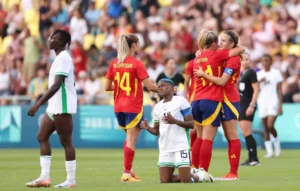
Nothing quite parallels the dizzying mania that sports elicits in the hearts of men. Charles MacKay, in his immortal musings, captured a fundamental truth about this collective madness: “Men, it has been well said, think in herds; it will be seen that they go mad in herds, while they only recover their senses slowly, one by one.” Nowhere is this mass madness more vividly illustrated than in the fevered obsession over global sports events. Millions cheer, weep, and even fight over tournaments that, when the dust settles, have done little to salve the wounds of a world beset by far graver concerns. The game is but a fleeting balm, a placebo offered to a populace, as governments across the world gleefully embrace the distraction as their most potent tool.
The medieval Romans mastered the art of subduing the masses with “bread and circuses,” and though their empire crumbled long ago, their strategies remain very much alive in the hands of modern rulers. The gladiatorial games, once a spectacle of bloodshed to sate the people’s primal thirst for violence, have been replaced by grand sports tournaments. The essence, however, remains unchanged. In a Machiavellian dance of power and distraction, global sporting events are designed not merely to entertain but to divert attention from the festering rot within. Corruption, inflation, insecurity—these words evaporate from public consciousness when the whistle blows and the world gathers for yet another tournament.
In Nigeria, the drums of this deceptive spectacle beat just as loudly. The nation, beleaguered by misgovernance, insecurity, and endemic corruption, joins the feverish race for sports glory with an enthusiasm that borders on the absurd. For every football match won or Olympic medal dreamed of, the agonies of its people are momentarily forgotten. Yet the problems—unemployment, poverty, terrorism—loom ever larger, like shadows ignored in the heat of celebration.
In 2024, the absurdity assumed worrisome dimensions, when breakdancing was officially recognized as an Olympic sport. The Paris Games, wildly touted as the pinnacle of human athletic prowess, was graced by a spectacle hitherto restricted to a street corner, far from the international stage. To compound this betise, a Nigerian NGO, in partnership with the United States Mission in Nigeria, launched an initiative to promote breakdancing among Nigerian youths. Workshops, masterclasses, and webinars—each a cog in this bewildering machine of misplaced priorities—were held in Abuja and Lagos. American breakdance experts Macca Malik and Jacob “Kujo” Lyons even graced the land, engaging with the Nigerian Olympic Committee and organising workshops for northern Nigerian breakdancers. The sheer audacity of it all was laughable—teaching young Nigerians to breakdance while their homes burned, their stomachs ached, and their futures crumbled.
At the School for the Deaf in Kuje, a breakdancing club was established, as if such a frivolous pursuit could soothe students living in a region ravaged by terrorism and banditry. It is a cruel joke, a gleaming mask to hide the ugliness of the country’s abandonment of its youth.
In a nation where basic needs go unmet, where the cries of the impoverished are drowned out by the sound of government coffers being emptied into bottomless pits of corruption, to spend time and resources on such a thing as breakdancing is to willfully dance on the grave of national potential.
And yet, the charade persisted. In Lagos, the American envoys conducted more masterclasses and promised careers in breakdancing, as though this spectacle of motion could truly lift anyone from the quagmire of poverty. Two champions, plucked from this initiative, were announced as Nigeria’s hopefuls for the Paris 2024 Games, ready to dance their way into international fame. But what did any of this matter? What tangible benefits could this bring to the fishermen of Sankwala, the farmers of Obafemi Owode, or the displaced families of Konduga and Madagali? Their soil remains barren, their rivers dry, their homes unsafe. The spectacle of breakdancing is but a gaudy distraction from the tragedy of their lives, a glamorous bait to reel in the next generation of pawns in this grand confusion.
It would be amusing if it were not so tragic. Sports in Nigeria has become a golden calf, worshipped with blind devotion while the real gods—education, infrastructure, security—are left to decay in the shadows. When the Nigerian contingent returned from Paris in disgrace, without a single medal to their name, the Minister of Sports, John Enoh, issued a public apology. “We owe Nigerians an explanation,” he declared, puzzled by the abysmal performance. Yet, no apology could suffice for the N12 billion sunk into this ill-fated venture. This colossal sum, which could have provided education, healthcare, or job opportunities for countless youths, was instead squandered on a futile race for fleeting glory. No medals, no victory parade—only the bitter taste of failure and the nagging question of what that money could have achieved if spent wisely.
When the Super Eagles came second at AFCON 2024, the nation erupted in fevered joy. Yet, as the euphoria subsided, reality dawned with crushing weight. The footballers returned to their cushy contracts, the NFF and sports ministry officials pocketed their bonuses, and the rest of the country remained in darkness—both metaphorically and literally, as power cuts and economic despair persisted unabated. What lasting good did the Super Eagles’ valiant effort bring to Nigeria’s suffering masses? None. The unemployed youth of Ajegunle, the impoverished farmers of Madagali, the destitute families of Waasimi—all were left no better off than they were before the tournament began.
The truth is that sports, in Nigeria, has become a smokescreen, a tool of mass deception. When Nigerian athletes defect to other countries and win medals for their adopted homelands, the media erupts in scripted vituperation, accusing Nigeria’s leadership of fostering such betrayal. Yet, the real betrayal lies not with these athletes but with a government that fails to provide them—and millions of other citizens—the opportunities to thrive within their own country. As Nigeria haemorrhages talent, its leaders stand bewildered, offering empty apologies for poor performances while failing to address the systemic rot that drives so many to flee.
Nigeria must get its priorities right. Sports is not an essential industry, nor is it the cornerstone of national development. The country can do without international sports glory if it means redirecting resources to where they are most needed—building roads, electrifying communities, eradicating insecurity, and providing the youth with real, tangible opportunities for success. The nation’s obsession with sports is a reflection of how much Nigerians prioritise spectacle over substance, distraction over development.
President Bola Tinubu’s administration must steer Nigeria away from this madness. The empowerment of the country’s youth through education, entrepreneurship, and infrastructure must take precedence over the thrill of competing on the international stage. Patriotism lies not in cheering for a football team or a breakdancing champion but in building a nation where every citizen can thrive. Frantic rationalisation about what gains could be had from hosting and participating in sports tournaments is absurd and insensitive. The N12 billion wasted on Paris 2024 could have funded countless small businesses, empowered thousands of youths, or revitalised communities devastated by terrorism.
It’s about time Nigeria withdrew from the global sports circus, to refocus its energies on more productive ventures. Let the world chase after medals and trophies. Nigeria must chase after prosperity and peace. For when the applause fades and the lights dim, it is not the gold around a victor’s neck that will heal a nation’s wounds but the steady, patient work of building a future for all.
-

 Uncategorized7 years ago
Uncategorized7 years agoThese ’90s fashion trends are making a comeback in 2017
-

 Uncategorized7 years ago
Uncategorized7 years agoThe final 6 ‘Game of Thrones’ episodes might feel like a full season
-

 Uncategorized7 years ago
Uncategorized7 years agoAccording to Dior Couture, this taboo fashion accessory is back
-
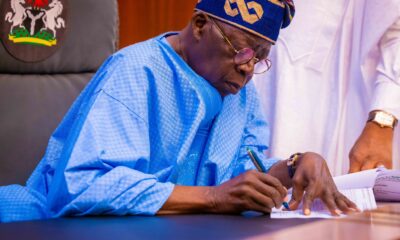
 Insight7 months ago
Insight7 months agoTinubu sacks two heads of govt agencies, picks replacements
-
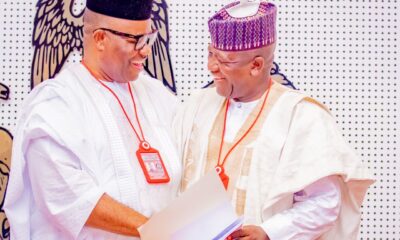
 News10 months ago
News10 months agoNigeria Moves Up In Corruption Perception Index – TI
-

 Uncategorized7 years ago
Uncategorized7 years agoThe old and New Edition cast comes together to perform
-

 Uncategorized7 years ago
Uncategorized7 years agoUber and Lyft are finally available in all of New York State
-
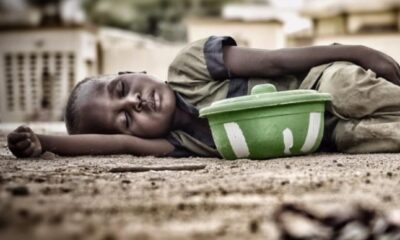
 Insight6 months ago
Insight6 months agoWhere little boys die young




